
The 2001 Tour de France was a multiple-stage bicycle race held from 7 to 29 July, and the 88th edition of the Tour de France. It has no overall winner—although American cyclist Lance Armstrong originally won the event, the United States Anti-Doping Agency announced in August 2012 that they had disqualified Armstrong from all his results since 1998, including his seven Tour de France wins from 1999 to 2005. The verdict was subsequently confirmed by the Union Cycliste Internationale.

The 1997 Tour de France was the 84th edition of the Tour de France and took place from 5 to 27 July. Jan Ullrich's victory margin of 9:09 was the largest margin of victory since Laurent Fignon won the 1984 Tour de France by 10:32. Since 1997 no rider has had this convincing of a win with the closest margin to Ullrich's victory being Vincenzo Nibali winning the 2014 Tour de France with a gap of 7:39. Ullrich's simultaneous victories in both the general classification and the young riders' classification marked the first time the same rider had won both categories in the same Tour since Laurent Fignon in 1983. The points classification was won by Ullrich's teammate Erik Zabel, for the second time, and their team Team Telekom also won the team classification. The mountains classification was won by Richard Virenque for the fourth time.

The 1987 Tour de France was the 74th edition of the Tour de France, taking place from 1 to 26 July. It consisted of 25 stages over 4,231 km (2,629 mi). It was the closest three-way finish in the Tour until the 2007 Tour de France, among the closest overall races in Tour history and the 1st, 2nd, 3rd and 4th place riders each wore the Yellow jersey at some point during the race. It was won by Stephen Roche, the first and so far only Irishman to do so.

The 1988 Tour de France was the 75th edition of the Tour de France, taking place from 4 to 24 July. It consisted of 22 stages over 3,286 km (2,042 mi). The race was won by Pedro Delgado with the top three positions at the end of the race being occupied by specialist climbers. This Tour was nearly 1,000 km shorter than the previous few editions, which were over 4,000 km, but by no means easier as it included five consecutive mountain stages including a mountain time trial.

The 1991 Tour de France was the 78th edition of the Tour de France, taking place from 6 to 28 July. The total race distance was 22 stages over 3,914 km (2,432 mi). The race was won by Miguel Induráin, whose Banesto team also won the team classification. The points classification was won by Djamolidine Abdoujaparov, although he almost crashed out in the final stage. The mountains classification was won by Claudio Chiappucci, and the young rider classification by Álvaro Mejía.

The 1983 Tour de France was the 70th edition of the Tour de France, run from 1 to 24 July, with 22 stages and a prologue covering a total distance of 3,809 km (2,367 mi) The race was won by French rider Laurent Fignon. Sean Kelly of Ireland won the points classification, and Lucien Van Impe of Belgium won the mountains classification.

The 1975 Tour de France was the 62nd edition of the Tour de France, one of cycling's Grand Tours. It took place between 26 June and 20 July, with 22 stages covering a distance of 4,000 km (2,485 mi). Eddy Merckx was attempting to win his sixth Tour de France, but became a victim of violence. Many French spectators were upset that a Belgian might beat the record of five wins set by France's Jacques Anquetil. During stage 14 a spectator leapt from the crowd and punched Merckx in the kidney. Frenchman Bernard Thévenet took over the lead. After Merckx subsequently fell and broke his cheekbone, he was unable to challenge Thévenet, who went on to win the Tour with Merckx second.

The 1982 Tour de France was the 69th edition of the Tour de France, taking place from 2 to 25 July. The total race distance was 22 stages over 3,507 km (2,179 mi). It was won by Bernard Hinault, his fourth victory so far.

The 1978 Tour de France was the 65th edition of the Tour de France, one of cycling's Grand Tours. It took place between 29 June and 23 July, with 22 stages covering a distance of 3,908 km (2,428 mi).
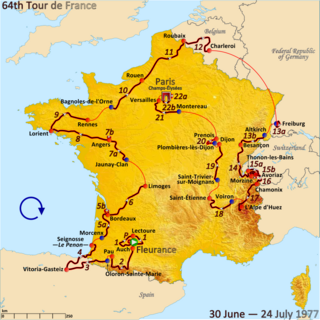
The 1977 Tour de France was the 64th edition of the Tour de France, taking place between 30 June and 24 July. The total race distance was 22 stages over 4,096 km (2,545 mi).
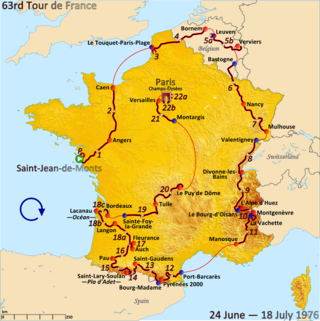
The 1976 Tour de France was the 63rd edition of the Tour de France, one of cycling's Grand Tours. It took between 24 June and 18 July, with 22 stages covering a distance of 4,017 km (2,496 mi). It was won by mountain specialist Lucien Van Impe in a battle with the previous winner Bernard Thévenet and Joop Zoetemelk. Zoetemelk won three high mountain stages including Alpe d'Huez and Puy-de-Dôme but this Tour became known for when the young directeur sportif of Van Impe, Cyrille Guimard, threatened to run Van Impe off the road with the Team Car if he didn't attack. Van Impe then attacked and won the Tour.

The 1974 Tour de France was the 61st edition of the Tour de France, one of cycling's Grand Tours. It took place between 27 June and 21 July, with 22 stages covering a distance of 4,098 km (2,546 mi). Eddy Merckx was attempting to win his fifth Tour de France in as many races.
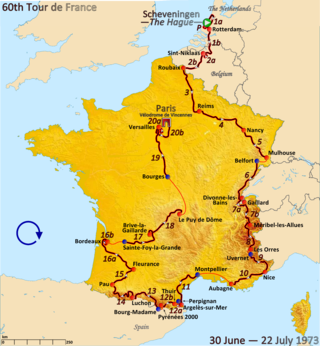
The 1973 Tour de France was the 60th edition of the Tour de France, one of cycling's Grand Tours. It took place between 30 June and 22 July, with 20 stages covering a distance of 4,090 km (2,541 mi). Eddy Merckx, winner of the previous four editions, did not start the 1973 Tour, partly to avoid angry French fans and partly to please his sponsor; instead he rode and won the 1973 Vuelta a España and the 1973 Giro d'Italia. In his absence, Luis Ocaña dominated the race by winning four mountain stages and two time trials. The result being a margin of victory exceeding 15 minutes.
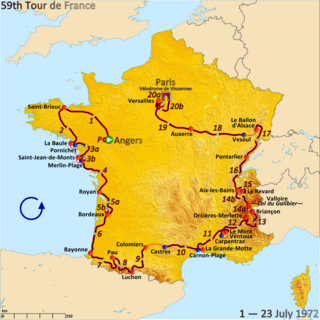
The 1972 Tour de France was the 59th edition of the Tour de France, one of cycling's Grand Tours. It took place from 1 to 22 July, with 20 stages covering a distance of 3,846 km (2,390 mi). After riding strongly in the first two weeks of the race and being the closest GC contender to Eddy Merckx, Luis Ocaña crashed, in the Pyrenees, leaving Merckx to battle Cyrille Guimard for the win. Guimard, having won four stages, had to leave the race after stage 17 in second place, but was given the combativity award after the race.

The 1970 Tour de France was the 57th edition of the Tour de France, one of cycling's Grand Tours. It took place between 27 June and 19 July, with 23 stages covering a distance of 4,254 km (2,643 mi). It was the second victory for Belgian Eddy Merckx, who also won the mountains classification, and nearly won every major jersey for a 2nd year in a row but finished second in the points classification behind Walter Godefroot by five points. The previous year only one rider was able to keep him within 20:00 and in 1970 a mere four other riders were within 20:00, with only debutant Joop Zoetemelk finishing inside 15:00 of Merckx.

The 1968 Tour de France was the 55th edition of the Tour de France, one of cycling's Grand Tours. It took place between 27 June and 21 July, with 22 stages covering a distance of 4,492 km (2,791 mi). Eleven national teams of 10 riders competed, with three French teams, two Belgian teams and one from Germany, Spain, the United Kingdom, Italy, the Netherlands, and a combined Swiss/Luxembourgian team.
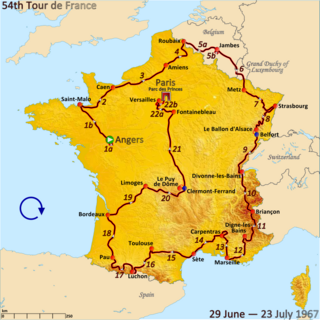
The 1967 Tour de France was the 54th edition of the Tour de France, one of cycling's Grand Tours. It took place between 29 June and 23 July, with 22 stages covering a distance of 4,779 km (2,970 mi). Thirteen national teams of ten riders competed, with three French teams, two Belgian, two Italian, two Spanish, one each from Germany, United Kingdom and the Netherlands, and a Swiss/Luxembourgian team.
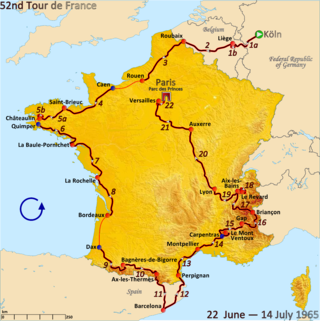
The 1965 Tour de France was the 52nd edition of the Tour de France, one of cycling's Grand Tours. It took place between 22 June and 14 July, with 22 stages covering a distance of 4,188 km (2,602 mi). In his first year as a professional, Felice Gimondi, a substitute replacement on the Salvarani team, captured the overall title ahead of Raymond Poulidor, the previous year's second-place finisher.

The 1959 Tour de France was the 46th edition of the Tour de France, taking place between 25 June and 18 July. The race featured 120 riders, of which 65 finished. The Tour included 22 stages over 4,358 km (2,708 mi).

The 1958 Tour de France was the 45th edition of the Tour de France, taking place from 26 June to 19 July. The total race distance was 24 stages over 4,319 km (2,684 mi).






















